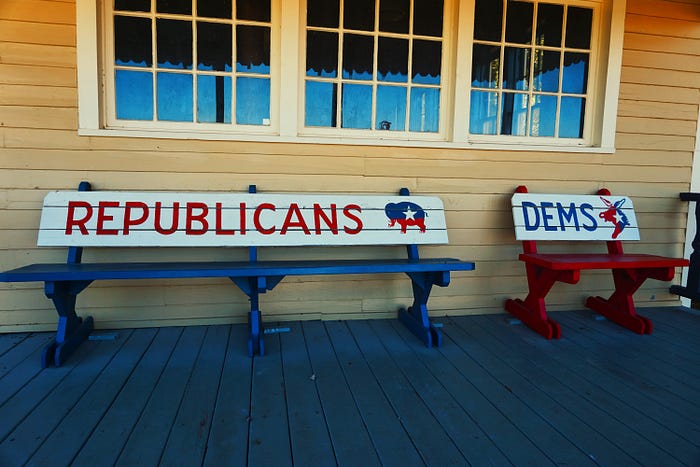At least, that’s what the media thinks.

“Will Gas Prices Tank Electoral Prospects for Democrats?” asked Sasha Abramsky for The Nation last week.
“As gas prices rise, Democrats scramble to lay blame on Big Oil,” wrote Evan Halper for the Washington Post on October 4.
“Can blaming corporate greed save Democrats on inflation?” wondered Christian Paz for Vox back in June. “Some progressive groups are urging Biden and Democrats to more aggressively cast corporations and billionaires as enemies in the fight against inflation.”
“Will Abortion Be Enough to Save Democrats This November?” wondered the New Yorker in a similar vein. “For Democrats, Fear Is the Path to Victory in November,” predicted David Faris for Newsweek in July.
“Ahead of U.S. midterms, Democrats struggle to find footing on violent crime,” concluded Reuters in June.
“Americans are more worried about crime than at any other time this century,” wrote Harry Enten for CNN. “Off-the-charts gas price hikes are a big problem for Democrats,” Enten wrote that same month.
“Can Democrats Turn Things Around?” asked Amy Walter for Cook Political Report in May.
“The Bad New for Democrats on Crime and Immigration,” as Ed Kilgore wrote for the New Yorker in August, is that likely voters care about those things and the Democratic Party isn’t addressing them.
“Biden Goes to Pot,” quipped David A. Graham for the well-known liberal outlet The Atlantic on Thursday. “Will it work?” though not explicit, was implied.
“Whether or not encouraging Americans to spark one sparks a Democratic vote in November, approval for his announcement is likely to be, well, high,” Graham concluded pithily.
Nervous questions about the upcoming election are suddenly everywhere: Will Black voters show up on Election Day? Do apathetic Hispanic and Latino voters plan to sit this one out? Will young voters turn up in sufficient numbers to help the Democratic Party avoid big losses this November? Will abortion motivate recalcitrant midterm voters?
Four weeks from Election Day and the polls aren’t looking great for the Democratic Party. Republicans have a creeping edge, which is worsening daily across the board. It’s is bad news for many reasons, not least of which because Republicans almost never enjoy such favorable polling this close to an election or at any other time.
Pollsters, who worldwide have been mostly striking out over the last few election cycles, still haven’t fixed the new problems with polling. Since those problems usually involve undercounting likely Republican and conservative voters, the polls are probably even worse than we know.
In deep-blue New York, Republican gubernatorial challenger Lee Zeldin is within two-points of incumbent Democratic Party Governor Kathy Hochul.
In some all-important and highly competitive swing-state races, the outlook is even more grim. From Pennsylvania to Georgia, New York to Los Angeles, Republicans are gaining, catching and passing their Democratic Party rivals.
“Nevada shows signs of growing red wave,” reported The Hill today. “Recent polling has shown Republican Senate hopeful Adam Laxalt leading Sen. Catherine Cortez Masto (D-Nev.), albeit within the margin of error, and demonstrated that Republicans’ preferred midterm issue- the economy and inflation- is dominating the minds of residents from the tourism-focused state.”
Into this maelstrom of hand-wringing and finger-pointing, even more storms are brewing. This October is already shaping up to be full of surprises as both parties dump oppo research en masse and go all-in against their political opponents.
One day, it’s a blanket pardon for those convicted under federal law for a simple marijuana charge; the next, President Joe Biden is warning of impending nuclear war and actually using the word “Armageddon.”
As for President Biden, the press can’t seem to make up its mind as to whether he is a help or hinderance for vulnerable Democrats facing difficult reelection races.
Some progressives are certainly sounding the alarm, begging the Democratic Party to change course and broaden the focus from cultural issues and Donald Trump.
“Democrats shouldn’t focus only on abortion in the midterms,” implored Sen. Bernie Sanders in an op-ed for The Guardian today, a statement sure to induce an avalanche of Twitter criticism. “That’s a mistake.”
“America has long faced structural economic crises,” Sen. Sanders wrote. “Democrats must win on the economy and present a pro-worker agenda.”
Other Democrats are equally full of advice party progressives are very unlikely to take.
“Embracing a public safety platform will help Democrats heal democracy for all,” wrote Jeh Johnson for USA Today on June 18.
“Democrats Should Embrace Patriotism,” wrote the Liberal Patriot Ruy Teixeira on Substack October 6, adding; “No, America is Not a Racist, Dystopian Hellhole.”
It was an excellent think-piece, likely to be as well received as Teixeira’s other tilts against the windmills of most-modern progressivism: “Democrats Must Move to the Center on Cultural Issues,” and, “Democrats Must Promote an Abundance Agenda.”
At least progressives are no longer talking about defunding the police.
Whatever else they are doing, Democrats aren’t promising the working class a better life; and it’s hurting Democratic Party prospects this election.
The main question most undecided voters will be asking themselves doesn’t involve the future prospects of abortion access in America or the Green New Deal: It’s a backward-looking question.
“Am I better off now than I was two years ago?”
For too many independent and undecided midterm voters, the answer is going to be a resounding “no”.
(contributing writer, Brooke Bell)